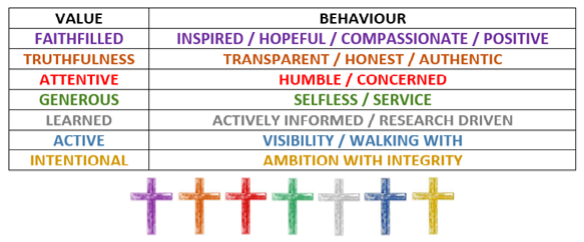“What’s the greatest commandment?”
In our latest blog Ciran Stapleton, our Executive Trust Improvement Advisor, reflects on why telling people what to do is no way to prepare the leaders of tomorrow.
Drawn together by nothing more than a shared sense of values, the St Thomas Catholic Academies Trust was born in the middle of the Covid crisis. We faced challenges none of us had seen before and had to make decisions on issues of which no-one living had any experience.
Two years on, the issues we face are very different, and the style of leadership we need is different too.
Developing future leaders:
Our future leaders have to learn how to work out the next ‘best moves’ as that is what great leaders do. Writing a ‘to-do’ template for decisions based on today’s experiences won’t equip them to make situational decisions in the future. We can’t have leaders who need to ask what it is they need to do at every issue; we’ll need leaders who will be able to think through what they have to do. They will need to make sense of situations and people, embrace paradox and, in the context of our own Trust, master the tension between the rich traditions of our local areas we serve as schools and being in a collaborative Trust, and still find ways to win – doing all this in the service of others.
Seeing and discerning leadership:
If you want to know what someone’s next moves or decisions will be, start by working out what their values are – it will explain why they do what they do and thereby what are likely to do next. Additionally, asking why someone performs the task they do will tell you everything behind who or what that task will influence. And here’s the point for us – Jesus’ response to a question about what the greatest commandment is, wasn’t about what to do, rather it was about how to do. There’s an aversion in the answer Jesus gives, avoiding getting too tied down to strict observance of any ritual for the ritual’s sake when it contradicts other principles. I hope I’m not being heretical here, but it looks as if developing a character of selfless love is the intent behind the Christ’s teaching above laying out a ‘to-do’ template.
So let decision making and leadership be centred on our core values which work their way out of this commandment. Learning the details around our specific roles involves painstaking standards that require a high level of professionalism, but if it’s not authentic to who we are then we’re denying others the opportunity to develop by being an example for others. That personal example is what underpins Trust. It’s the force multiplier than gets the best out of everyone and the fuel of high performing teams. Our character led values need investing in at every level; to know why the timetable is set as it is, to know why the content in PSHE is as it is and to know why we buy that child who is difficult to love, the repairs for their bike so he or she can get to school.
When we do this, we fall into line with a tradition that is at least 2000 years old. The Aztecs built their temples, the Egyptians built their pyramids, but we people of the Book built schools, and our Faith has endured by its lived out example and experience. Its important, because as leaders we’re lucky enough to slipstream in and out of the ancient history of our schools. Although the shape of them may change, as society has over the last 4000 years, it falls to us as custodians to continue the lived tradition of the martyrs.

